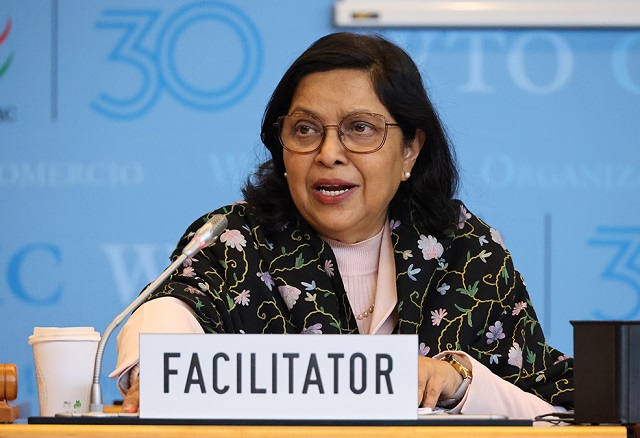La facilitadora de las negociaciones sobre la reforma de la solución de diferencias insiste en la necesidad de intensificar los debates
La facilitadora de las negociaciones sobre la reforma de la solución de diferencias insiste en la necesidad de intensificar los debates.

El 11 de octubre, la Embajadora Usha Dwarka-Canabady de Mauricio, facilitadora de las negociaciones sobre la reforma de la solución de diferencias, acogió con satisfacción la “buena marcha” de las conversaciones, aunque declaró que los Miembros de la OMC tendrían que intensificar los debates en las próximas semanas para cumplir el objetivo de contar con un sistema de solución de diferencias plenamente operativo y que funcione debidamente para finales de este año. La Embajadora hizo uso de la palabra en una reunión de Jefes de Delegación para proporcionar información actualizada a los Miembros sobre la situación actual de las conversaciones.
“We have been working steadily and making good progress, but I think we can all agree that we now need to further intensify our discussions at a more accelerated pace and focus specifically on finding convergence, in particular on appeal/review issues, to get to a final solution,” Ambassador Dwarka-Canabady told members.
“(W)e will need a very special effort for the next ten weeks to get to convergence as we are mandated to do so,” she added. Ministers “gave us a timeline … We need to do our best to respect that decision and to put in the extra effort for the next ten weeks.”
At their 12th Ministerial Conference (MC12) in June 2022, WTO members agreed to conduct discussions with the view to having a fully and well-functioning dispute settlement system accessible to all members by 2024. That commitment was reaffirmed by members at MC13 earlier this year.
Ambassador Dwarka-Canabady was appointed by members as facilitator for the dispute settlement reform talks in April. Six co-convenors were subsequently appointed to assist her in the process.
Since September, the co-convenors have held a series of meetings with experts to advance the technical work, with meetings dedicated to the issues of appeal/review, accessibility, and transparency.
On the issue of accessibility of the dispute settlement mechanism, Ambassador Dwarka-Canabady said work has progressed to the point where she believes the experts can move to drafting text on the issues of technical assistance and capacity building. However, significant differences remain on the issue of litigation costs. She stressed that members were working on the basis of securing a single package of decisions and that there was no mandate for an “early harvest” on settled issues.
On appeal/review, the facilitator said “there has been some valuable progress” on this difficult topic, with extensive discussions on some issues. “We now need to move forward and carve out solutions. Our hope is to use the month of October to develop as much convergence as we can, and hopefully start drafting in early November or even the end of October, if this is possible.”
Reporting for the co-convenors on the issues of appeal/review and accessibility, Jessica Dickerson (Australia) briefed members on the technical work organised around six sub-topics under the appeal/review heading:
- On access to the dispute settlement mechanism and the form of the mechanism: very good conversations have helped members deepen understanding of each other’s interests and concerns, but no breakthroughs have been achieved to date.
- On the standard of review that adjudicators should apply in reviewing a panel’s decision: members have different views regarding whether the existing standard should be clarified or changed and, if so, how.
- On the issues of scope of review, reducing/changing incentives to appeal, and clarifying members’ expectations of adjudicators: four potential reforms have been identified that show promise for their potential to address some interests and concerns of members. Experts are continuing to discuss other reform ideas under both scope of review and reviewing/changing incentives to appeal.
Reporting for the co-convenors on issues related to accessibility, Claudia Diaz Paulino (Mexico) said the following:
- On the issues of capacity building and technical assistance, the experts had very productive discussions which give the co-convenors confidence that the shape of a solution or solutions has started to emerge. Specifically, members recognized that paragraphs on capacity building and technical assistance in the draft consolidated text circulated last February under the informal process met their interests but that additional elements could be included.
- On litigation costs: while the discussions have been constructive, the co-convenors assessed that differences appear very wide apart on this topic and that more work needs to be done to identify areas of convergence.
More than 30 members then took the floor, some speaking on behalf of groups of members, to comment on the interventions by the facilitator and co-convenors.
Ambassador Dwarka-Canabady said her takeaways from the interventions was that there is agreement on the need to accelerate the work and to start drafting on issues that are mature in order to try and put together a text as early as possible. She also said that there was no objection to pushing up issues which have been exhaustively discussed at the expert level to the Heads of Delegation level for consideration. Members will need to have a focused strategy to resolve issues which will require ad hoc Heads of Delegation meetings that may be called at short notice, depending on progress made. Her door remains open to any member wishing to discuss any matters, she added.
















